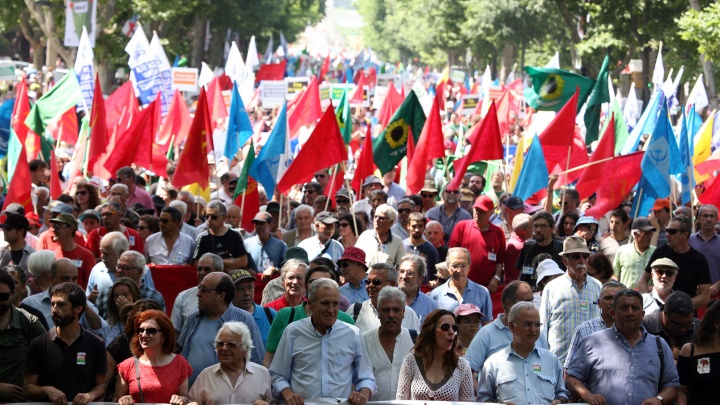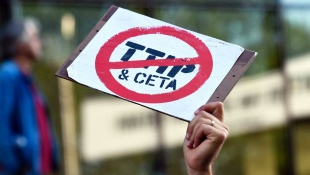The PCP Central Committee met on the 21st February 2016 to analyse the political situation and assess the activities, strengthening and political initiatives of the Party and the struggle of the masses.
I – Portugal is not condemned to a path to decline
The national and international situation has been marked by a deepening of capitalism structural crisis.
Despite the enhancement of the offensives of the great powers against the rights of the workers and the people, the plunder of national resources, the mercantilisation and privatisation of different economic and social aspects, the State intervention in hundreds of banks handing over significant amounts of public funds, the creation of new speculative mechanisms and the financialisation of the economy, the usurpation of the rights of the sovereignty of the people, pressures, interference and aggression against those who question the will and power of the monopolies and capitalism, aiming to recover losses, intensify exploitation and obtain new profits, in fact not only remain but there is an escalation and intensification of the manifestations of the socio economic plan of the structural crisis of capitalism at a global level.
A structural crisis of capitalism, which in the European Continent and particularly in the European Union – as revealed by the last meeting of the European Council, – is still expressing itself through the degradation of the socio-economic situation, the increase of contradictions with elements of disaggregation, such as for example the position of the United Kingdom within the European Union (the so called Brexit case), the instability of the banking sector, in the deepening disparities between the major powers of the European Union and what are called the peripheral countries.
2. The last years in Portugal represent a deep economic, social and democratic set back. The actions of the PDD/CDS government, in the aftermath of decades of a policy of right, for which PS, PSD and CDS are responsible for, exacerbated by the SGP and the Policy of Aggression, have led like no other government has done before, since the times of fascism, to a policy of exploitation and impoverishment serving the interests of the monopolies taking the country to a dramatic situation. Unemployment, emigration, poverty, the serious lash out against the rights and victories of the workers and the people, the theft of salaries and other income, the destruction of jobs and the degradation of public services, the looting of the national resources – through the interests of the debt, privatizations and the destruction of the productive capacity– the total submission to the impositions of the EU, the ECB and the MIF, faced an intense resistance as well as the struggle of workers and Portuguese people, which led to the defeat of the PSD and CDS and the immediate projects of the great capital to whom they are associated, during the elections of the 4th October.
3. The possibility opened by the defeat of the PSD/CDS and the new balance of power in Parliament, to open the way to recover rights an income stolen, has faced a virulent political and ideological offensive, with a strong upsurge of a political campaign against the PCP and its role in the defence and reaffirmation of the rights of the workers and the people. Forces associated to the transnational capital, powered by the internal plan of PSD, CDS and the most reactionary circles of the Portuguese society and in the external plans of the European Union institutions and other structures serving the interests of monopolist capital, have undertaken an intense operation of interference, blackmail and pressure, trying to force submission and surrender to its goals and its policies of national extortion. Despite the contradictions and shortcomings of the present situation, what these sectors cannot tolerate are measures which yet shy and hesitant move away from a path of political decline, exploitation and impoverishment which constitute its program and that they planned to expand and proceed with.
II – A new cycle in the national political life– addressing the more urgent aspirations and intersses of the portuguese people
1. In the actual phase of the national political life, in the follow up of a long process of mass struggles, with the new balance of power in Parliament, the actions of the government in a framework of joint positions which have meanwhile been signed, are reflected, by initiative and intervention of PCP, measure and provisions which address the most urgent problems faced by the Portuguese people, which are in itself proof of how the country is not condemned to a path leading to the intensification of retrocession and impoverishment.
2. Over the past months, it was possible to curb the concession and privatisation of inland public transport companies; change the disability protection structure; revoke measures which are detrimental to the dignity of teachers and adopt assessment measures with the view to improve learning and educational success; restore pension supplements to workers of the state sector; protect family homes forfeited by tax foreclosure; restore the bank holidays which had been withdrawn.
It was also possible, although not reaching the proposals defended by PCP, to stop pay cuts to public administration workers; ensure the reduction of tax returns surcharges, on a progressive level to be eliminated in 2017; open the way to the restitution and fixation of the 35-hour work schedule in Public Administration; raise the National Minimum Wage, setting it at 530 Euro, still behind the 600 Euro suggested by the PCP.
Achievements and progress which is important to value and consolidate, not forgetting, nonetheless underlying political options linked to right wing policies which led PS to give continuity to processes which conflict with the national interests such as BANIF, CP Carga, TAP or the financing of the employers through the decrease of SST.
3. In response to the current situation, the PCP has intensified its political initiative with a set of proposals presented to the Parliament for : combat precariousness; the revocation of the Public Administration regulations; the suspension of the increase in rents and evictions within supported housing; the access of doctors to internship; reversion of the handover of hospitals to the Misericordia; elimination of tolls; the recruitment of scientific research fellows; recruitment of Higher Education teachers by public recruitment for permanent positions; the defence of the water as a public asset. Proposals to which other will soon be added other legislative initiatives, namely the progressive application of the 35 – hour week work for all workers, for the integration of the Novo Banco in the public banking sector and for the development of a process for the renegotiation of the debt.
4. The new stage of the national political life faces now, with the presentation and assessment of the State Budget for 2016, a not less important moment, resulting from the political developments which after the 4th of October have guaranteed the defeat of the PSD/CDS government.
The Committee Central of the PCP highlights that the State Budget for 2016 is a document under the responsibility of the PS. The fact that it could or should express the commitments undertaken by the PS with the framework of the Joint Positions, does not change this fundamental fact. It conveys in itself all the limitations and possibilities reflected in the level of what has been achieved a convergence level and the commitments which were possible to agree on. The State Budget reflects the inherent contradictions, to seeking in a non-achievable manner, address in a coherent and consistent manner a reversal of the policy of exploitation and impoverishment while simultaneously follow the rules, impositions and external constraints, be them the submission to the Euro, to the Stability Pact or the unsustainable debt.
The non-existence of a structural response to the debt problem, the low levels of public investment, the exacerbated indirect tax options which are more generally applied on the Portuguese people, namely an increase in fuel tax, the insufficient taxation of big businesses and movable assets are manifestations of the limits and shortages of this budget and its chosen options.
5. The proposal of the Ste Budget, albeit not the one the country needs, opens, however, the possibility, which should not be undermined, of restoring rights and income, curbing part of the destruction and improving the functioning of public services, making progresses, however shy, in the economic groups taxation, resisting to the unacceptable interference of the European Union.
Unlikely the course which had been forced upon over the last years and the projects which the PSD/CDS took on and were in fact under way – specifically keeping salary cuts at least until 2019; the attack and destruction of the social functions of the State (such as the proposed reduction of over 600 million Euro in retirement pensions); the continuation of privatisation such as those of STCP, da CARRIS or the Underground; the favourable tax treatment of big businesses, namely by the reduction of IRC 17%; the intensification of the exploitation against workers with new changes do employment law – the State Budget proposal give expression to the already approved positive measures and show signs of reversion which allow for positive measures, addressing the legitimate needs of the workers and the people, to be discussed and materialised.
The State Budget proposal, in whose positive measures PCP had a determinant role, allows the achievement of: a reduction upon restrictions to hires in the Public Administration, in particular Local Administration; a first step towards the fight against precarity in Public Administration with the inventory of situation of existing precarious contracts; the end of exemption of real estate funds from taxation; the reduction of VAT to 13% for restaurants; the increase in the Contribution of the Banking Sector; measures for a fairer taxation on profits, namely with some limitation upon tax exemptions and reduction of deadlines to report losses; the introduction of IRS deductions for children or ascendants and updating the tax brackets; the increase in deductions for expenses due to deficiency; the introduction of an escape clause in the real estate tax; contracts for family doctors, by contracting 700 young doctors in training between 2016 and 2017 and the temporary hire of retired doctors; the guarantee to contract doctors that did not have an opening to start their internship; positive change regarding health fees; contracts for PhDs into the National Scientific and Technological System.
Furthermore, the Budget proposal also entails other already approved measures regarding reposition of wages, elimination of a IRS overtax, unfreezing pensions, increase of social benefits for families, Social Income, Solidarity Complement for the Elderly and Subsidy for Assistance by a Third Party.
Among other measures, PCP will fight, during the Budget discussion, to achieve the progressive introduction of free school books, stop the increase in university tuition, improve the unemployment subsidy, reduce the maximum rate of real estate tax, lower the contribution of workers towards the public administration health system and other public health sub-systems, decrease the tax burden upon micro-, small- and medium companies, increase the value of pensions and retirements.
And simultaneously, PCP will also fight against negative measures in the proposal, such as, among others, the maintenance in 2016 of the participation by local authorities in the State revenues, the maintenance of restrictions imposed on workers and services in the Public Administration and the State Business Sector with impact upon their incomes, carriers, progressions and other rights, the concession of Solipor and IP Telecom.
6. The Central Committee of PCP must also draw attention to the unacceptable blackmail, pressure and interference directed against the State Budget by the European Commission, rating agencies and the centers of big capital, which reveals the nonconformity of these sectors for a path, albeit limited, of inverting the exploitation and impoverishment that the PSD/CDS Government imposed over the last years.
The campaign moved in the last weeks against the State Budget proposal, exploiting its limits and contradictions, which are inseparable from the options of the Socialist Party (PS), does not derive from concern for the so-called national interest or the rigor and credibility of public accounts and, much less, from social concerns about incomes and tax burden upon the populations. What is behind this campaign, promoted among others by PSD and CDS in articulation with the economic groups and with the orientations and structures of the European Union, is much further that the revanchist spirit of who saw their projects to deepen exploitation and impoverishment defeated, it is the concern for the results and example of the struggle of workers and populations that is enabling the reposition of the rights and incomes stolen from them.
7. The vote favoring the State Budget that PCP assumes in the general vote is inseparable from the evaluation of its framework, development and political repercussions and the positive elements that we register in the Budget proposal and that, although of limited reach, can answer immediate problems and expectations of Portuguese workers and people. And simultaneously involves the determination and commitment such that the Budget may correspond, also during the committee meetings, the best possible for these aspirations and expectations.
III – A patriotic and left wing policy – objective that is imposed
The first months of the PS government, the measures and decisions taken since then, the State Budget proposal that is under appreciation, reveal, as PCP always stated, that the path of sovereign development, social progress and job creation that Portugal needs demands not only a rupture with the imposition of the European Union and other foreign constraints, but also a rupture with decades of right-wing policies and with the interests of monopolist capital that dominate the Country.
If there is an aspect that results from the appreciation of these months, and without prejudice to the positive developments for the people and Country, it is the limited character of the political solution and the need to continue to intervene and struggle to give ever greater strength to a real political alternative, a patriotic and left-wing alternative that PCP proposes to the Portuguese people.
A policy that: assumes the need to renegotiate the public debt, it is deadlines, interest rates and amounts; ensures the public control of the banking sector (where one need include the maintenance of the New Bank as a public bank); prepare the Country for freedom from the submission to the Euro; respond to the need for increases in wages, retirements, pensions and other worker’s and people’s incomes; values labor and the rights of workers; taxes big capital firmly and adequately; upsurges public investment, centered upon the defense and stimulation of national production; promote public services; defend and guarantee national sovereignty in the face of external impositions and constraints; and free the country from the path of capitalist integration of the European Union.
Achieving a alternative patriotic and left-wing policy, while inseparable from the consolidation of all the positive measures achieved in the meantime and from the fight against negative measures and aspects and right-wing orientations that still prevail, requires simultaneously as determinant elements the broadening of the intervention and struggle of workers and populations and an increasingly greater support to PCP, its proposals and political initiatives.
IV – Reenforce the Party, intensify the political initiative, develop the struggle
Given an increasingly complex and demanding national and international framework, where enormous dangers and threats coexist with the possibility of resisting, struggling against and defeating the current offensive, PCP confirms itself as an irreplaceable force for the Portuguese workers and people and irreplaceable in the process of social transformation that the country needs.
The reinforcement of PCP, in the year it will hold its 20th Congress on December 2-4th, constitutes an objective and need in which the members and organizations of the Party need to commit to. The struggle for the defense, reposition and conquest of rights is an indispensable option to improve living conditions, defend the Country and open the way towards a rupture with the right wing policy.
Confident in its own forces and intervention, secure in its history of 95 years of struggle, PCP reaffirms its commitment with the Portuguese workers and people towards the achievement of an advanced democracy based on the values of April, an inseparable part of the struggle for socialism and communism.



